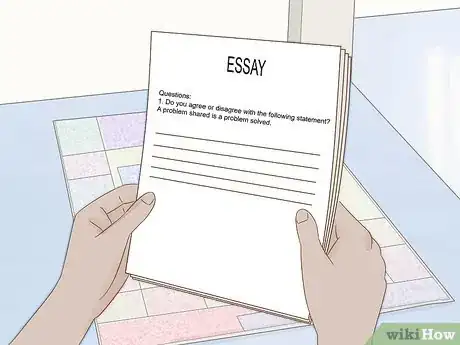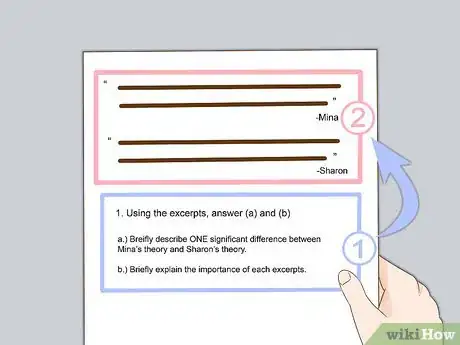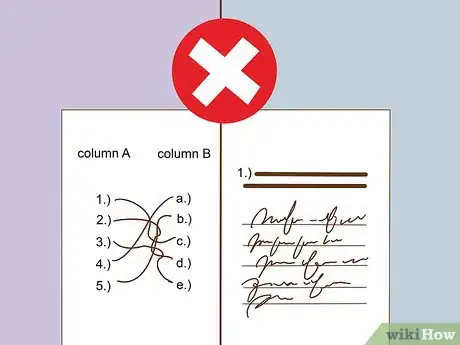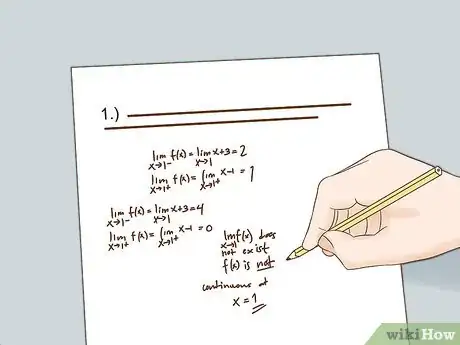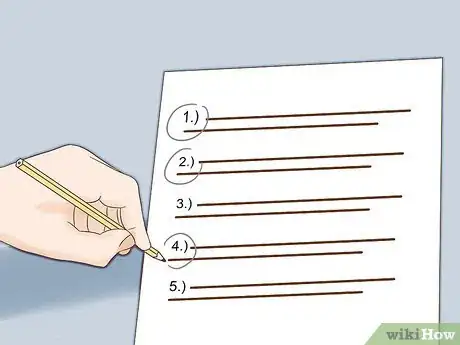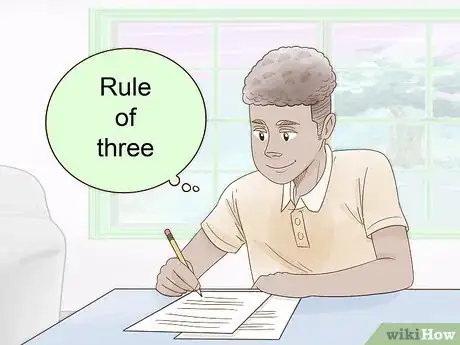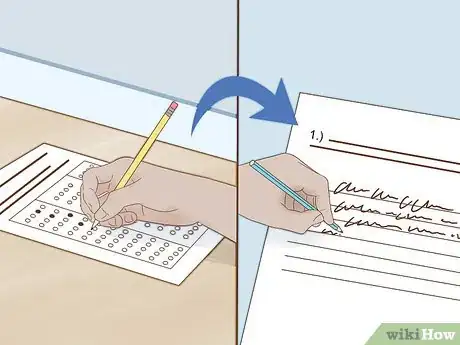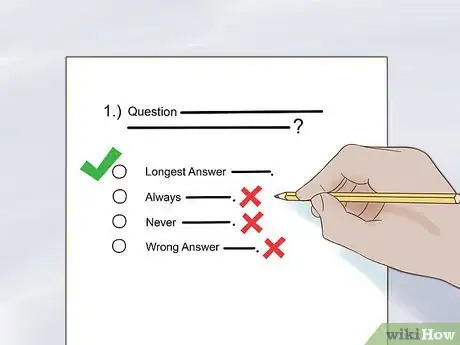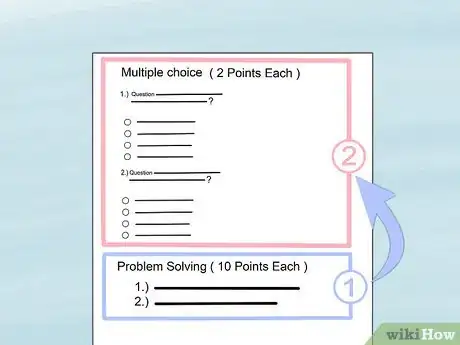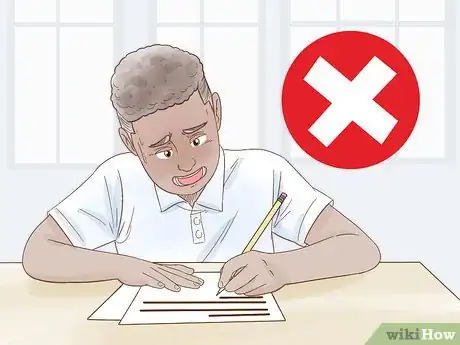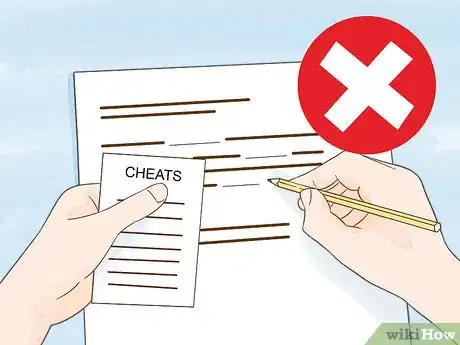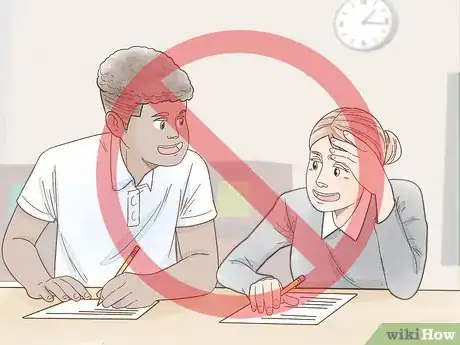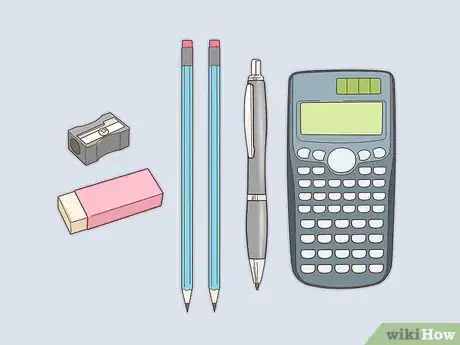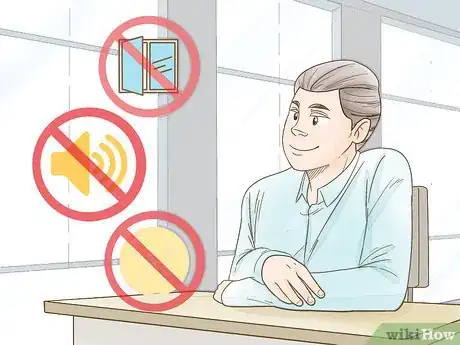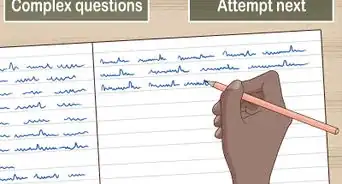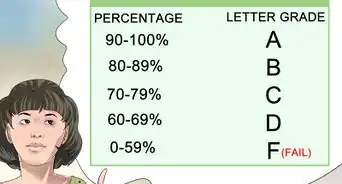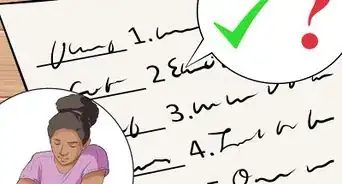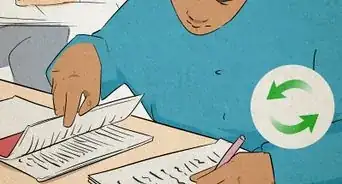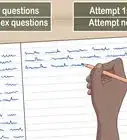This article was co-authored by Michelle Golden, PhD. Michelle Golden is an English teacher in Athens, Georgia. She received her MA in Language Arts Teacher Education in 2008 and received her PhD in English from Georgia State University in 2015.
There are 8 references cited in this article, which can be found at the bottom of the page.
wikiHow marks an article as reader-approved once it receives enough positive feedback. In this case, several readers have written to tell us that this article was helpful to them, earning it our reader-approved status.
This article has been viewed 127,041 times.
Taking a test can be a very stressful and scary thing, but it is something that everyone must do from time to time. Making high marks on your tests is important because your grades will assist in determining what kind of college you get into and, eventually, what kind of job you’ll be able to get. Knowing how to be a good test taker is a very useful skill because it can reduce the amount of time needed for preparation and the levels of anxiety you feel about test taking in general.
Steps
Previewing the Test
-
1
-
2Read each question carefully (especially the essay questions). You don’t want to end up answering something that wasn’t actually asked simply because you didn’t read the question thoroughly.
- When you are stressed about a test, sometimes the tendency is to read too fast and try to get through the test as quickly as possible. But this is when careless mistakes happen. Slow down, take your time, and read each question thoroughly.
Advertisement -
3Read all the questions before reading any excerpts. If you are required to read a long excerpt (several paragraphs), you should read the questions first before you start trying to answer them. Then, as you do the reading, you will know what to be looking for specifically.[3]
Taking the Test
-
1Make it easy for the teacher to grade your test. There is nothing worse than getting a question marked as incorrect simply because the teacher couldn’t read your handwriting. Remember that your teacher has many tests to grade, so the less time s/he has to spend grading your test, the happier s/he will be and this might reflect in his or her grading choices.
- For example, drawing spaghetti-line intersecting lines from column A to column B is likely to be marked down by a teacher who also has 74 other tests to mark.
- Similarly, print don't write; you don’t want to get something marked wrong just because the teacher can’t decipher your sloppy handwriting.
- Don't make your Ts look like Fs; spell out True and False.[4]
-
2Show intermediate results. You might get partial credit, if you did everything right but just made a silly mistake right at the end. Partial credit is always better than no credit. So show your work as you go so your teacher can see that you know at least some of the material and got it right.
- This step is only useful for solving math questions on an exam.
-
3Go through the test steadily. Keep a rhythm of underlining words you don't know and circling questions that you get stuck on. Never come to a complete halt – you should always be writing, reading, or turning a page.
- The important thing is not to get frustrated and just quit. You only have a limited amount of time, so you need to make every moment count.
- If you struggle with a particular problem or section, skip it! You can always come back to it later. And this way you’ll be making the most of your time to ensure you get through the entire test.
-
4Remember the rule of three. A good rule of thumb to follow when writing an essay for an exam is the rule of three. It usually works better to discuss (or list or...) three things about the subject. Include many more and you get bogged down in too much detail. Any fewer and you are probably leaving something important out.
-
5Work strategically. It is important to move through the test in a way that will benefit you and make the most of the time you have. Don’t just start the test and hope you finish in time. If you have both multiple choice and essay questions, do this:
- Read the essay questions first. Write down any notes, but, do not answer them yet.
- Begin answering the multiple choice questions. While you are doing so, your brain will be gathering information contained in these questions that will help you answer the essays. If needed, write brief notes that you can use later for the essays.
- Once you have all the multiple choice questions answered (and, you will have checked one box for each of them), then do the essay questions, beginning with the easiest.
-
6Answer multiple choice questions smartly. When it comes to multiple choice questions, it is always better to guess than to leave it blank. A blank answer is an automatic wrong answer, while a guess (especially an educated guess) gives you at least a chance at getting it right. Here are some tips for answering multiple choice questions:
- The longest answer is usually the correct answer because the correct answer requires more qualifying language to be indisputably correct than the incorrect answers.[5]
- Answers that contain words like always or never are almost always incorrect because most truths don’t exist as absolutes.
- Try eliminating one or two answers that you know for a fact are wrong. There is almost always one answer that is obviously incorrect and then another one or two that you can guess about. Eliminating wrong answers will greatly increase your chances of guessing the right answer from the remaining choices.
- Pay attention to the answers of surrounding questions. Even randomly generated tests tend to not repeat answers often. So, if you know the answer to number 1 is A and the answer to number 3 is also A, it is highly unlikely that the answer to number 2 will be A as well.
Thinking Strategically
-
1Pay attention to point values of the questions. Get started on the questions that are worth the most points first, all other things being equal. This will ensure that you are able to answer all the higher point value questions that matter more, rather than wasting time on the questions that count for fewer points.
-
2Be thorough. If you finish early, look through all your answers again. Give special attention to questions with underlined words. Don't stop working until the final bell.[6]
- If you finish early, maybe you missed answering all the questions. Go back and make sure there are other questions (like on the back side of a sheet), up on the blackboard, on sheets you dropped on the floor, etc.
-
3Don't panic and don't give up. You may only be getting half your answers right, but, that could be a passing mark, even a top mark depending on the curve.
- Tests can be daunting, but you almost always know more than you think you do. Once you get in there and start taking the test, you will remember a lot more.
- If you struggle with a section, simply move on and come back to it later. Wasting time on something that you don’t remember at the moment might mean that you run out of time before you can answer questions that you definitely know the answers to.
- Also, sometimes there will be hints for the question that you are stuck on later on in the test that will jog your memory. Keep moving through the test and come back to the parts that gave you trouble at the end.
-
4Don't ever cheat. You could get caught, and get a zero. Or worse. Don't write notes to yourself on your body, where it can be found (instead, use the strategy in #2, above). If you copy wrong answers from a neighbor, teachers are quick to notice this. And forever after teachers will know you as "The Cheat."
- Spend the effort you might devote to cheating on doing the best possible job you can honestly. If you fail, use the experience to motivate yourself for the next test.
-
5Never talk to your friends during test conditions. This might mean that you will not concentrate and you will not get the grade that you were expecting to get. Also, if the teacher catches you talking, s/he might give you a failing grade and you will not be able to retake your test.
- Taking a test is not the time to talk to your friends. You need to dedicate all of your brain space to the test in front of you. This will help you be more successful.
- Many teachers consider talking during a test as an attempt at cheating, even if you were not discussing the test. So don’t do it.
Being Proactive Ahead of Time
-
1Pay attention in class. Teachers will usually spend a lot of time in class emphasizing certain subjects that s/he really wants you to know. These are typically topics that will be on the test. Make sure you thoroughly study anything that your teacher took great pains to teach you in class.
- Additionally, if your teacher gives you a study guide for the test, make sure you can answer questions about everything listed on the study guide.
- If your teacher took the time to make you a study guide, that means s/he is serious about testing on these topics. It can be a great hint for you in knowing what to study.
-
2Ask the teacher for extra help if you need it. Ask your teacher to stay after school with you. If s/he can, ask him or her to go over the stuff that is most confusing to you. This will make a big difference on your grade!
- Teachers remember who goes the extra mile by asking for help or really trying and this can impact their grading choices when they grade your test. If you are really putting out a lot of effort but your teacher never sees it, that doesn’t help you very much.
- Make sure your teacher sees all the work you put in by asking him or her for help and talking to your teacher about what you’re struggling with.
-
3Use your short term memory. While studying just before the test, write down very basic notes on what you find hardest to remember. Just before the test, memorize these notes; this will load them into your short term memory. Once you get the test paper itself, regurgitate (that is, write) this information as notes into the margin of the test.[7]
- For example, many exams require that you know various formulas, whether they are related to math, science, or some other field. If you have to memorize a lot of formulas, commit them to memory immediately before the test and then write them down in the margins as soon as you begin taking the test.
- The formula for the area of a circle is A = πr² (with r being the radius).
- Commit this to your short term memory and then write it down immediately when you get your test.
- For example, many exams require that you know various formulas, whether they are related to math, science, or some other field. If you have to memorize a lot of formulas, commit them to memory immediately before the test and then write them down in the margins as soon as you begin taking the test.
Creating a Pre-Test Routine
-
1Dress up before a test. If your exam is early, then the process will help wake you up. Also, it will make you feel more professional and alert while working on your test. Keep in mind that you don't want to be uncomfortable. Layer, so that you won't be distracted by an overly warm or cold room.
- Try to prepare what you will wear the night before. If you pick out your outfit ahead of time, you will have more time in the morning to focus on eating a good breakfast and running through your notes again. You want to save all of your brain work for reviewing for the test the morning of, not deciding what to wear.
-
2Get a good night's sleep. Cramming into the wee hours, then trying to be sharp for the test is a really bad idea. It is important to be well rested when you take a test.[8]
- Lack of sleep can seriously affect your brain function in areas of memory, perception, and the level of cognitive capacity at which you can function.[9] So getting a good night’s sleep the night before a test is crucial.
-
3Eat a healthy meal beforehand. Your brain functions better when it has all the nutrients it needs. Eat a good breakfast (or lunch, depending on when your test is) before you take the test. This will help you perform at your best while taking the test.
-
4Come fully prepared to take the test. Bring everything you need: pens, pencils, erasers, calculator, etc. Don't expect others to provide these items for you. Your teacher and your classmates may not have extras all the time and you don’t want to be forced to take a test without an item you need.
- Pack your backpack the night before so that you know you’ll have all of the items you need. You don’t want to rush around in the morning and accidentally forget something crucial.
-
5Arrive early to choose the best seat for you. If you don’t have assigned seating, come early to class so you can pick a great seat. You want to be away from windows, heaters, and away from any other distractions like a noisy hallway or another student you know will be distracting with their behavior. When you get there early, you get to choose your spot.[12]
How Can I Cope With Test-Taking Anxiety?
Expert Q&A
-
QuestionWhat food should I eat before an exam?
 Ted Dorsey, MATed Dorsey is a Test Prep Tutor, author, and founder of Tutor Ted, an SAT and ACT tutoring service based in Southern California. Ted earned a perfect score on the SAT (1600) and PSAT (240) in high school. Since then, he has earned perfect scores on the ACT (36), SAT Subject Test in Literature (800), and SAT Subject Test in Math Level 2 (800). He has a BA in English from Princeton University and a MA in Education from the University of California, Los Angeles.
Ted Dorsey, MATed Dorsey is a Test Prep Tutor, author, and founder of Tutor Ted, an SAT and ACT tutoring service based in Southern California. Ted earned a perfect score on the SAT (1600) and PSAT (240) in high school. Since then, he has earned perfect scores on the ACT (36), SAT Subject Test in Literature (800), and SAT Subject Test in Math Level 2 (800). He has a BA in English from Princeton University and a MA in Education from the University of California, Los Angeles.
Master's Degree, Education, University of California Los Angeles
-
QuestionWhat are some strategies to keep in mind when taking a psychometric test?
 Jake AdamsJake Adams is an academic tutor and the owner of Simplifi EDU, a Santa Monica, California based online tutoring business offering learning resources and online tutors for academic subjects K-College, SAT & ACT prep, and college admissions applications. With over 14 years of professional tutoring experience, Jake is dedicated to providing his clients the very best online tutoring experience and access to a network of excellent undergraduate and graduate-level tutors from top colleges all over the nation. Jake holds a BS in International Business and Marketing from Pepperdine University.
Jake AdamsJake Adams is an academic tutor and the owner of Simplifi EDU, a Santa Monica, California based online tutoring business offering learning resources and online tutors for academic subjects K-College, SAT & ACT prep, and college admissions applications. With over 14 years of professional tutoring experience, Jake is dedicated to providing his clients the very best online tutoring experience and access to a network of excellent undergraduate and graduate-level tutors from top colleges all over the nation. Jake holds a BS in International Business and Marketing from Pepperdine University.
Academic Tutor & Test Prep Specialist Work to improve your reading comprehension so that when you get to the question portion, you can critically look at each answer choice. Also keep in mind that extreme answer choices are usually wrong. Answers including overstatements, or the use of really strong language, are probably not going to be the right answer, as there's a margin of reasonableness often built into these tests.
Work to improve your reading comprehension so that when you get to the question portion, you can critically look at each answer choice. Also keep in mind that extreme answer choices are usually wrong. Answers including overstatements, or the use of really strong language, are probably not going to be the right answer, as there's a margin of reasonableness often built into these tests. -
QuestionWhat do I do if I have exam anxiety?
 Community AnswerMaking sure you are very prepared should help you calm your fears. Give yourself enough time to study so you go into the test with confidence. Feeling knowledgeable about the material will help you allay your anxiety.
Community AnswerMaking sure you are very prepared should help you calm your fears. Give yourself enough time to study so you go into the test with confidence. Feeling knowledgeable about the material will help you allay your anxiety.
Warnings
- Never time yourself by the people around you! How long it takes someone else to finish really has absolutely nothing to do with how they did or how you're going to do. It's just distracting.⧼thumbs_response⧽
- Don't stress yourself out about anything beforehand or during. Try to avoid getting sidetracked into potentially emotional conversations, even if that means not answering your phone.⧼thumbs_response⧽
References
- ↑ http://www.studygs.net/tsttak1.htm
- ↑ https://casc.byu.edu/testtaking-strategies
- ↑ http://faculty.bucks.edu/specpop/tests.htm
- ↑ https://img.memecdn.com/true-yet-false_o_938633.jpg
- ↑ http://uk.businessinsider.com/4-ways-to-outsmart-any-multiple-choice-test-2015-6?r=US&IR=T
- ↑ http://www.studygs.net/tsttak1.htm
- ↑ http://faculty.bucks.edu/specpop/tests.htm
- ↑ http://faculty.bucks.edu/specpop/tests.htm
- ↑ http://www.ncbi.nlm.nih.gov/pubmed/21075236
About This Article
Taking a test can be stressful, but you’ll feel better if you take it one thing at a time. Spend a couple minutes reading the instructions and skimming what’s on the test. When you’re ready to start, review each question carefully so you understand what you’re supposed to do. Make sure you write clearly so the teacher can read your answers easily. Show your work if possible, since it might help you get partial credit even if you don’t get the answer totally right. If you get stuck, try not to panic. You can try skipping ahead to another question, or use a strategy like eliminating answers you know are wrong. For more expert tips, like how to prepare before taking a test, read on!

